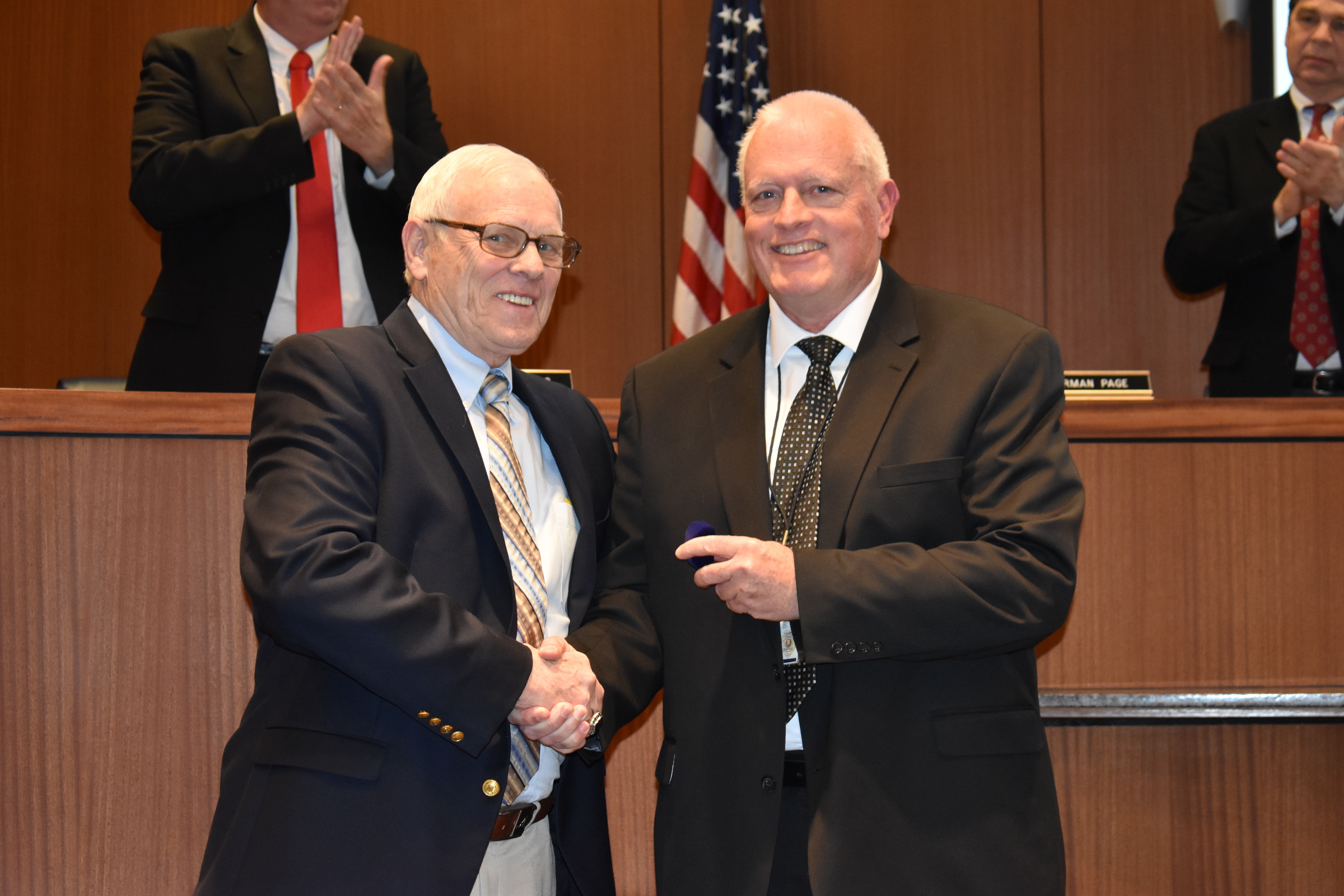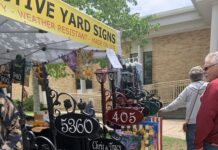Cullman Police Chief Kenny Culpepper, right, received a custom-made 40-year pin, presented by Councilman and Public Safety Committee Chairman Andy Page, and a standing ovation from the room, at this week’s Cullman City Council meeting. / W.C. Mann
CULLMAN – If you grew up or have lived in Cullman from the 1980s until now, you know the name Kenny Culpepper. A generation or two of kids remember him from classroom visits. He’s the mostly-quiet, definitely-humble, man in charge of the Cullman Police Department (CPD). On Monday evening, Chief Culpepper was honored by the Cullman City Council for a rarely-heard-of 40 years of service. For 30 of those years, he has served as chief.
After studying criminal justice at Auburn University (including an internship with the CPD), Culpepper joined the department in February 1978.
During the award ceremony, Assistant Chief Craig Montgomery said, “I can count on two fingers the number of chiefs in this whole state who have been on the job as a chief longer than him.”
CPD Office Manager Rita Bailey worked with the department’s insignia supplier to create a custom pin for the chief, since the company simply had nothing in its inventory to honor 40 years of service.
Before the council meeting, Culpepper recounted for The Tribune his first night with the CPD, along with a few other choice tidbits.
What does 40 years with the Cullman Police Department mean?
“A lot of good memories, a lot of good people.”
How did it start?
“Here’s the deal: I was a senior at Auburn, and I did my internship here. So, I remember the first call I went on with the police department as a college intern. I wasn’t even an officer.
“And I walked in, and Chief Roy Wood said, ‘You got a gun?’ I said, ‘Yes, sir.’ And I’m a college student. He goes, ‘Well, go over there and get you a uniform out of the closet.’ ‘Okay.’
“So I went, and the first call we went on, we went right over here (gesturing southwest of city hall): it was a doctor’s office that the alarm was going off. And back then they had the magnetic tape alarms on the windows, where if somebody breaks the window it breaks the tape. And what would happen: somebody would come in the lobby for a call or something, and scratch the tape to where it wouldn’t connect. The alarm would go off, the alarm would go off; then (the owners would) turn it off because they’d get frustrated with it. And then (the robbers) would come and burglarize or do something.
“Actually, I was riding with Officer Ron Burrow. So we were like a stake-out, in case they came and broke in.
“Well then, the second call: they called and said they needed backup at this house, because a guy had pulled a shotgun on two officers that had walked up to the door. Keith Brown and Russell White were the two officers that went up to the door.
“So we go flying over there, and Sgt. Bill Mickle was there. So he told Officer Burrow to go around back with the other two officers, and he looked at me, and he said, ‘Grab that shotgun out of the car.’ So I got the shotgun. And I’m a college intern; I’m not even a police officer, but I’m in uniform. Been with them for two hours or three hours, total.
“And he said, ‘Get behind this pine tree there.’ He says, ‘He’s got a shotgun; he’s inside that house. I’m gonna walk up to the edge of the porch and try to talk him into giving up. If he comes to that window behind me with that shotgun,’ he says, ‘you kill him. Don’t let him shoot me.’ I said, ‘Yes, sir.’
“So I’m behind this pine tree with a 12 gauge shotgun aimed at a window, thinking, ‘Oh, my gosh: my first night as a college intern doing a ride-along, and I’m gonna have to shoot this guy!’
“Well, anyway, the guy eventually passed out on the couch, and they were able to go inside and get him and everything. Nobody got hurt.
“And they came back over there, and Sgt. Mickle looked at me, and he said, ‘Now be sure and unload that shotgun.’ And I went (gesturing the racking of the shotgun slide), and I go, ‘There’s not even one in the chamber!’ And he said, ‘You mean you were covering me with an unloaded shotgun?!!’ Well, I just grabbed it out of the rack. I didn’t know; I thought they kept them loaded. I mean, it had some in the magazine, but not in the chamber.
“So I was hooked: you know, the adrenalin rush and the excitement; you know, the camaraderie of being in those kinds of situations had me hooked from that first get-go.”
What’s the biggest difference in law enforcement between now and 40 years ago?
“There’s just too many of them to really talk about, but the biggest thing now is just the technology. You think about, over the last 40 years, just in any business, all the different technological advances just in society, just with cell phones and computers, and all that.
“Back then, we didn’t have take-home cars. I think we had eight or nine patrol cars, and you would hot rack them. You know, you’d come in, and somebody else would get their stuff and put in it, and when you came in–you’d just share the same car over and over again.
“And the same thing on walkie talkies; we had enough to where the guys on duty had (one), and you just hoped you’d get enough of a charge to where you could make it through a shift. And no cell phones.
“When I started out, we had just a single bubble light on top, kind of like Andy (Griffith). And then we went to a double bubble; and we thought that was cool, because we had one on either side.”
How has Cullman changed?
“Just the growth. You know, when I started, up on (Highway) 157 you had Red’s Gulf and Joe’s Exxon–the two service stations–on the far side of the interstate, and there was nothing until you got to (Highway) 31, and 157 stopped right there. It didn’t go any further. And so, from there all the way to the interstate was just pasture.”
The final word
“My job’s always been easy, because number one, you’ve got a great community with great people, and number two, I’ve worked with great people and had great people in the department, and it’s made my job easy.”
Chief Culpepper was emphatic in stating his desire that people understand that 40 years is a milestone, not a destination. He has no plans to retire, yet.
“Just getting a pin,” he said, “just like everybody else.”
Copyright 2018 Humble Roots, LLC. All Rights Reserved.





























